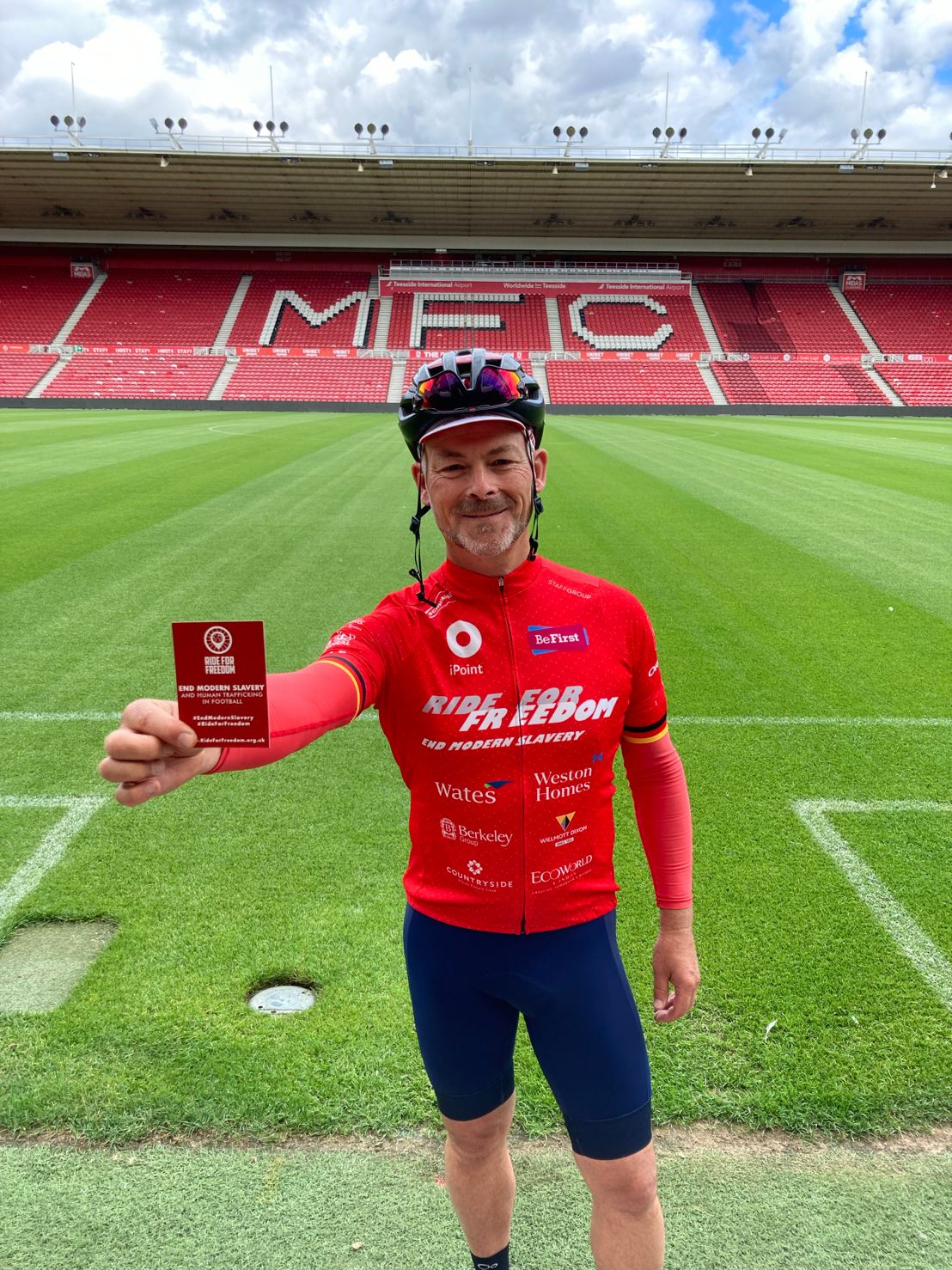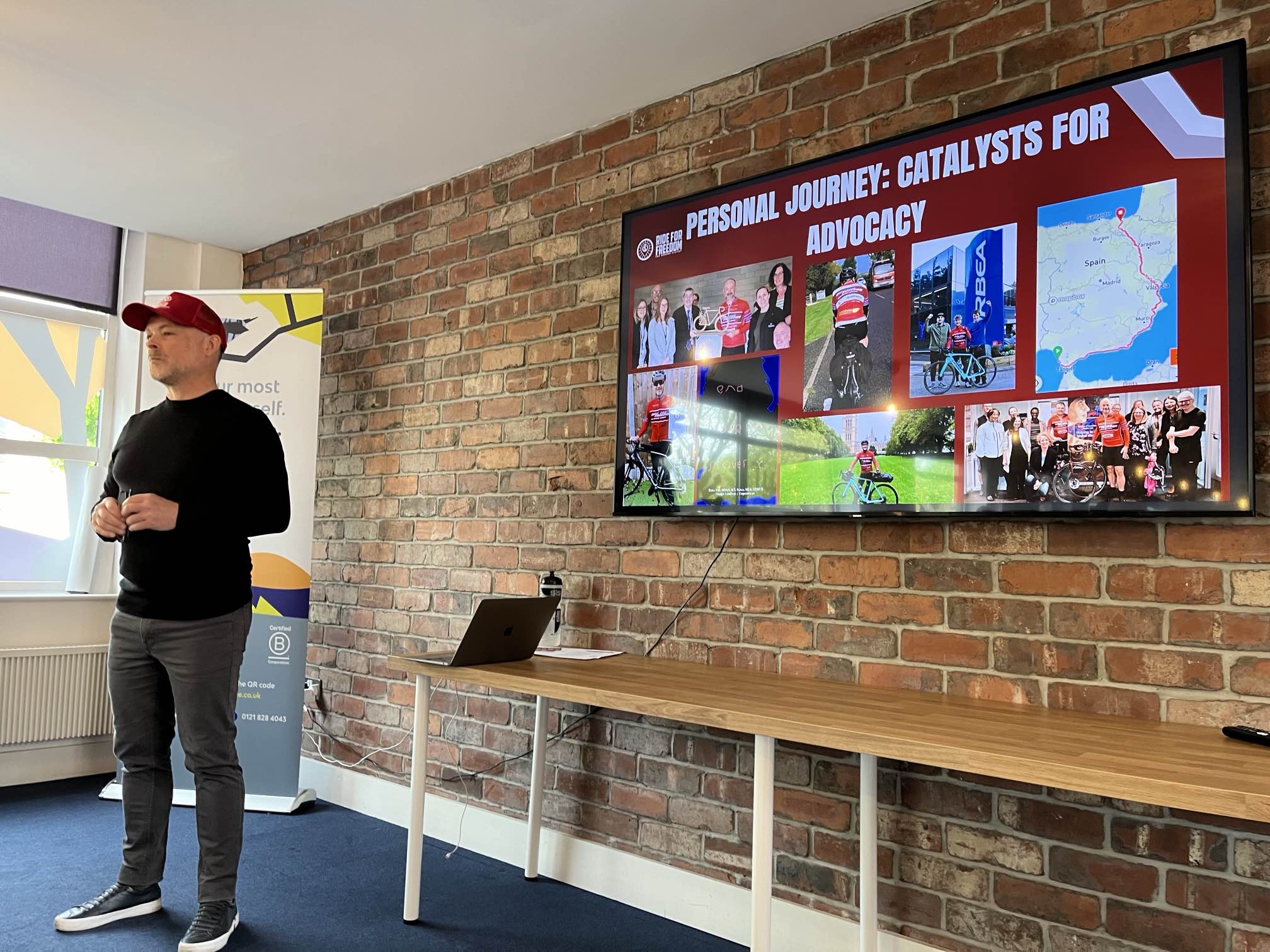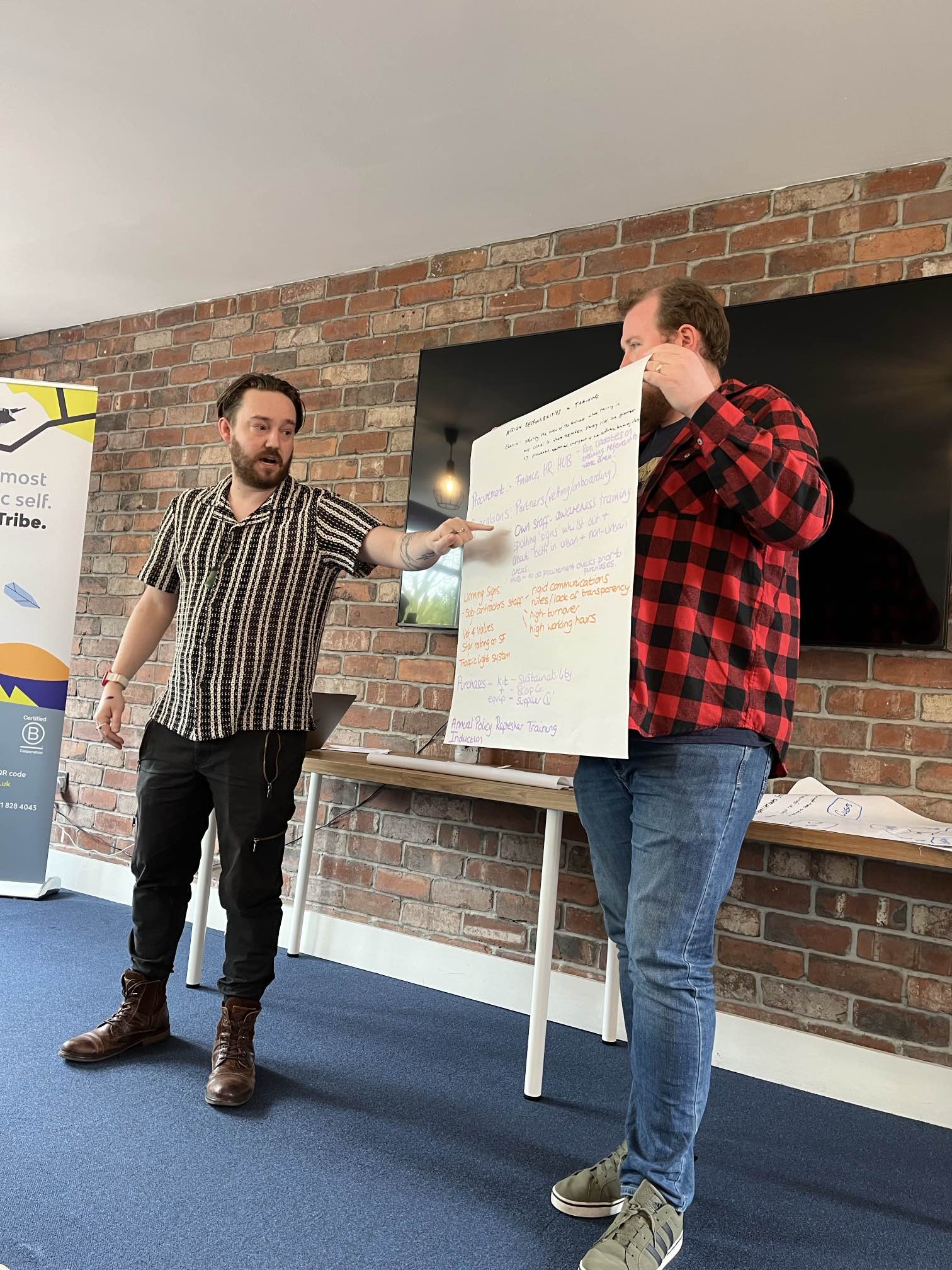Tyler Grange and the Ride For Freedom
26 Jun 2024
26 Jun 2024
“I must admit, I thought that I had a decent understanding about the issues surrounding modern slavery. What really shocked me was the scale of the problem, as globally there are 49.6 million people trapped in modern day slavery and an estimated minimum 100,000 victims of modern slavery and human trafficking in the UK.” – Jon Berry, Managing Director
At the recent Tyler Grange team day in Birmingham we invited along Gordon Miller, who is the Founder and CEO of https://rideforfreedom.org/. Gordon has an incredible passion for making a difference, and through his love of cycling, has raised important awareness about the true impacts of modern slavery and the steps we can all take to spot some of the key warning signs. He is an existing and current Guinness World Record holder, both aimed at raising awareness of modern slavery. Recently, he embarked on a 254-mile tour of Wales, focusing on the intersection between climate change and modern slavery.
We were privileged to be able to learn from and collaborate with Gordon and his organisation, so we got in touch once more to talk to him about the amazing work Ride For Freedom is doing, and how organisations and individuals alike can take action today to make a difference.
Ride For Freedom’s mission statement is:
“We channel the universal love of cycling to passionately raise awareness, educate, and build meaningful partnerships in the relentless pursuit of ending modern slavery.”
There are a lot of charities and non-profits in the UK and worldwide doing amazing work and advocating to end modern slavery. Ride For Freedom does it specifically through the lens of cycling, bringing together Gordon’s passion for cycling, his background in communications and journalism and an insatiable drive to make a change and end modern slavery across the globe.
“It was just me doing the cycling initially. Just to raise awareness. I thought with my comms background and knowledge of PR and connections, it could raise a lot of press coverage, and it did.” – Gordon Miller
From the early days of Gordon riding his bike to raise awareness, Ride For Freedom has grown into a non-profit organisation with global reach. The Freewheel Programme, uses the UK government’s national cycle training initiative, Bikability. The Freewheel programme supports survivors of modern slavery through a two-day course where individuals are trained in road cycling, skill development, and road safety.
The objective is to empower and support people, providing not only physical and mental health benefits, but crucially a sense of independence that has been stripped from them.
“People are coerced, controlled and forced into situations where they don’t have a choice. That’s the fundamental thing: they have no choice.” – Gordon Miller
The Modern Slavery Act was passed in the UK in 2015. Its chief aim is to enable law enforcement to effectively fight modern slavery. It also states that businesses over a certain size disclose the action they are taking to ensure modern slavery doesn’t exist in any part of their organisation.
It’s about making a real difference.
Modern slavery affects millions of people across the world. 28 million people are trapped in forced labour. One in every 130 women globally lives in modern slavery. £193 billion is made every year through modern slavery, over £5,500 a second. 12 million children are victims of modern slavery.
Perhaps the most famous example of modern slavery is that of Sir Mo Farah, who was trafficked into the UK from Djibouti as a child and forced to do housework and childcare. High-profile examples such as this are few and far between. As Gordon points out,
“The scale of this, it’s horrendous. The Home Office runs a programme called the National Referral Mechanism, where people are referred as victims of modern slavery. There were 17,000 people reported last year, either by themselves or by first responders. That’s quite a low figure, 17,000, because the unofficial figure is more than 122,000 victims in the UK at any given moment in time.”
To make the biggest impact they can in the fight against modern slavery, Ride For Freedom has established four pillars to the mission of their organisation: advocacy, education, collaboration and remediation.

The first step on the journey is raising awareness through campaigns such as the ‘Show A Red Card’ campaign. This came about to combat youth trafficking in the name of football where youths are promised a career in European football that doesn’t exist. They are then forced into criminal activities when they arrive in Europe.
Helping people to learn more about what modern slavery is, where it exists and how to recognise it. So far, Ride For Freedom has been able to educate over 3,000 schoolchildren on human rights and how to spot the signs of modern slavery through their Schools Programme.

Ride For Freedom collaborates with a diverse range of organisations worldwide, from large international entities to smaller local groups like ours. They rely heavily on the support, donations, and ongoing advocacy these partnerships bring.
The most challenging pillar in Ride For Freedom’s mission is providing effective solutions to this global issue. Their Freewheel programme offers remediation for survivors, symbolising freedom, independence, and new beginnings through cycling. By equipping them with bikes and accessories, they help survivors reclaim their strength, dignity, and hope, empowering them on their journey towards healing and recovery.
Funding and donations are crucial to helping their programmes and initiatives reach more and more people, build more relationships and raise more awareness. As Gordon says:
“We’ve got a global ambition. And it’s just a question of building our time and capacity and outreach as we go forward.”
From the first time we heard about Ride For Freedom and the work they were doing, we knew we wanted to find out more, to educate ourselves on the scale and impact of modern slavery and to understand what we could do about it.
“What is really encouraging and stimulating for me is when organisations are below that [£36m turnover] threshold, but they still want to understand modern slavery and see what they can do about it. It gives me a lot of confidence when companies come to us and want to work with us.” – Gordon Miller
Before the workshop, our Tribe took part in a survey to gauge our level of knowledge and understanding of modern slavery. We found that around 40% of us had heard about it before. By the end of the day, 90% of us felt that we understood the issue and what needed to be done about it. Here’s how we did it:
To begin with, Gordon introduced himself and the organisation and gave us some context and information about the cause. Then, it was over to us to put the work in to improve our own modern slavery policy, together in groups. We broke it down into six main sections, working in six separate groups. And each one looked at how we could capture, communicate and implement policies and practices to improve our own performance in each of these six areas.
In addition to the breakout groups, Gordon also brought with him a static bike. Each of our Tribe rode the bike in turn to remind us of the sense of freedom and individuality that the Freewheel Programme serves to restore in survivors of modern slavery.

“It’s really challenging. The only way it’ll ever come together is when all agencies work more collaboratively. Governments, policymakers, the United Nations, the police, border controls and more. But it also needs people, humanity to understand more about what modern slavery is, and actually call it out and get behind the advocacy.” – Gordon Miller
One of the most impactful actions an organisation can take is to partner with Ride For Freedom, demonstrating their commitment to ending modern slavery and establishing leadership in their field. By sponsoring and donating to support Ride For Freedom’s programmes, organisations can actively contribute to the four pillars of their mission.
There are lots of things we can do as individuals too, as Gordon pointed out,
“People can volunteer some time to support us with some of our activities, whether that’s joining a bike ride, going out into their community to collect some bikes for donation or if they’ve got mechanical skills, they can fix a few bikes and then donate them to us. They can donate some cash as well as time. They can advocate, if they see our social media posts, share them and talk to their community.”
Our workshop was the first in-person session that Gordon had held, and we found it to be a huge success in changing our attitudes and helping us to learn more about this grave, global issue. We were able to change our processes to learn more about what’s happening in the world and found out more about what we can do about it.
At Tyler Grange, we are taking steps to improve our approach and policy, thus better aligning with the United Nation’s Sustainable Development Goal 8.7 (to End Modern Slavery, Trafficking and Child Labour). We have transformed our own supply-chain over the last 12 months, undertaken a more thorough dive into the practices and policies of those suppliers we collaborate with and hugely reduced reliance on next day delivery services. Going forward, we’ll be fully supporting Ride For Freedom’s campaign and #ShowARedCard to the exploitation and enslaving of people across the world.
We encourage more people to get in touch with the Ride For Freedom team and book a workshop to learn more and start making a difference.